
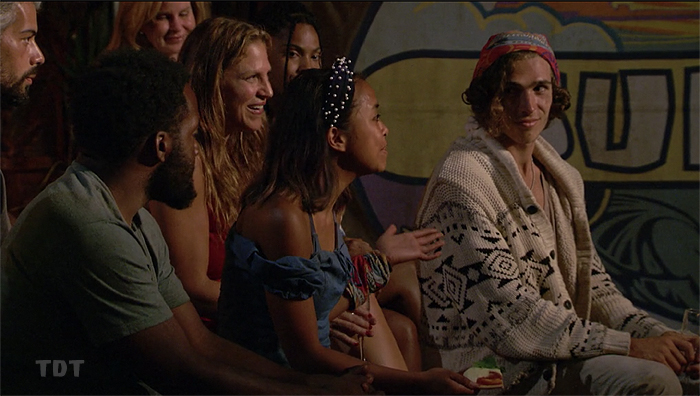
Last week, Survivor 41 came to an unconventional end, with a live-on-location jury vote reveal that hadn't been done since Borneo in 2000, followed by an actual New Era event, going directly into the "Survivor Aftershow." It was a night of actual firsts, as Erika claimed victory as the first Canadian winner, the first winner of Filipino descent, and the first female Sole Survivor in seven seasons.
It was a surprising finish, in part because the show made Erika barely visible in the first five episodes, really only present as part of a fictional storyline that she was targeting Sydney on Luvu, which led to Deshawn and Danny trying and failing to throw the immunity challenge. (In reality, targeting Sydney was Deshawn's idea, according to both of their exit interviews.)
Despite the underedit, Erika was an easy and near-unanimous choice for the jury, contrasted as she was with Deshawn's chaotic overplaying and what they perceived as selfish, lone-wolf gameplay from Xander. Rightly or wrongly, the jurors saw both Deshawn's and Xander's connections in the game (except the Danny/Deshawn bond) as largely transactional — making friends solely to move themselves ahead in the game. In contrast, everyone knew Erika and Heather were a tight, if unlikely, duo.
So in a lot of ways, as we'll get into below, Erika's win was less a "dawn of a new era," and more a continuation of the state of the game as it was when Tommy Sheehan won in season 39. Which is great! Even if it's clearly not what the producers were hoping for.
Erika: Hiding in plain sight
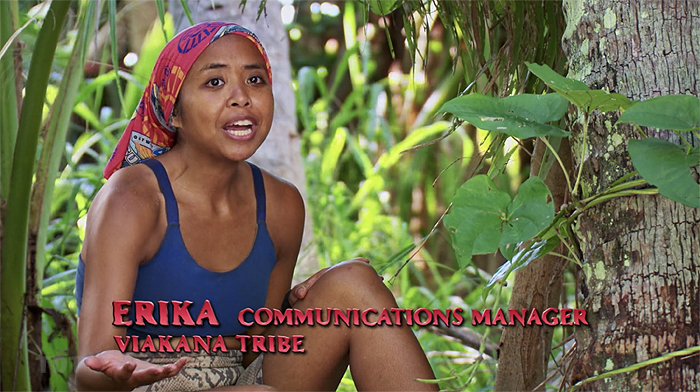
Erika's win is really hard to evaluate, because thanks to the editing, we saw so little of it. But as she elaborated on RHAP, by her own admission Erika's game wasn't really about "big moves," but rather one of positioning herself so that she was optimally situated for the next round after each vote. And that tracks. This is something that, say, Danny and Deshawn didn't do when they made the big move of voting out Shan, because it left them in a 4-3 minority position.
What Erika did best was classic Survivor gameplay: She made friends with people on the bottom (as she herself was at Luvu), and turned that into what eventually emerged as the dominant alliance. She started with someone she could depend on (Heather), and built out from there. She worked with Deshawn, with Ricard, with Xander, and eventually they were the final five. She was competitive in challenges (two individual wins) without being intimidatingly successful. She was efficient but stealthy at Tribal: She voted people out correctly 6 of 7 times (all post-merge, obviously), but received only 2 votes against herself. She didn't overpromise like Xander, she didn't make big showy displays. She was flexible, she was pleasant to be around, she knew what was going on at all times.
Most importantly at the end, while Deshawn was fumbling
apologies at Final Tribal, and Xander was busy misstating the
jury's perceptions, Erika had a clear professional advantage
in addressing the jury. As someone with a decade of experience
coaching people to make clear statements and prepare for tough
questions in the corporate world, she calmly, succinctly,
precisely stated her case for winning, and (even if the jury
had largely already decided) cleanly delivered her argument.
Against two younger guys who weren't quite reading the jury
accurately, it was no contest. An elegant finish to a solid
game, and one of the better Final Tribal performances in Survivor
history.
The perils of aggressive gameplay in a random game
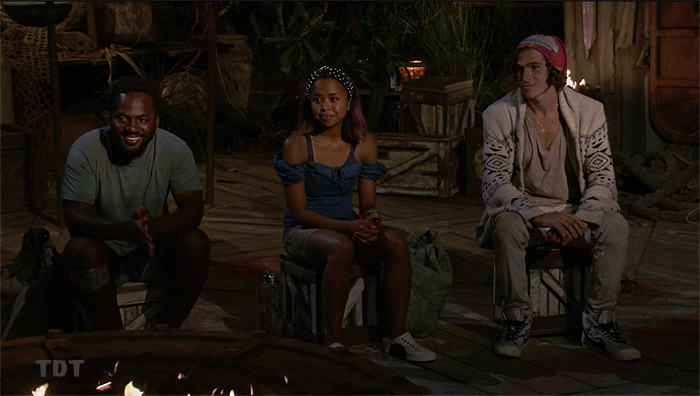
If there's one takeaway from Erika's win, it's that a calm, low-key, drama-free game is emerging as a reliable path to victory in modern Survivor. In the advantage-every-episode era, having the ability to work with everyone is critical, because you never know when you'll be swapped, or only the half the tribe will be at Tribal, or whatever other random twist changes the voting rules for the next round.
In the last all-newbie season, Tommy Sheehan won with pretty much the same approach: Be nice, don't make waves, stay in the numbers, avoid flashy Big Moves. Production doesn't seem to have caught on to this yet, which is hilarious, because if there's one thing Survivor's producers hate, it's people playing under-the-radar, low-key games. They're hard to illustrate to the audience, they're under-dramatic by design.
So in an attempt to prevent these types of approaches, production throws as many booby traps and trinkets into the game as possible, to at least create *some* reliable drama. And in doing so, they only increase the odds that the winner will be someone who avoids those traps. Which is perfect. The producers only have themselves to blame.
A lot of the newer twists and advantages are designed to cause interpersonal conflict. A vote-steal advantage is inherently punitive to someone else, it robs another contestant of their voice at Tribal. Liana's Knowledge is Power advantage ratcheted that inherently antisocial aspect up another notch. Adam Klein's reward-steal advantage in Millennials vs. Gen X was so obviously toxic that he gave it away. How many people could actually win after playing one of these?
Similarly, the convoluted scheming the Yase three (Xander, Evvie, Tiffany) put into thwarting the KIP advantage also came across as aggressively anti-Liana. Xander's "no, but you can have this fake one" line was a big, dramatic moment, sure. But in a social game, when you make someone look foolish in the most public setting possible, there will always be repercussions. Here, it probably made Liana's allies (Danny, Deshawn, Shan) like the Yases less.
This isn't even a new development. Bob Crowley made amazing-looking fake idols in Gabon, but he swiftly regretted letting Sugar Kiper borrow one to deceive Randy Bailey. Sugar's over-the-top cackling after Randy fruitlessly tried to play the fake angered both Randy's friends (all jurors or future jurors) and poor Bob himself, who looked bad for providing the ammunition. Russell Hantz never grasped this subtlety in playing three of the next five seasons, and never won — not because of "bitter juries," but because he was a grandstanding dick to his fellow castmates, both in camp and at Tribal.
If production wants more flashy Big Moves, it will need to dial back on the random-seeming twists, especially anti-strategy ones like Do or Die. Imagine if Xander had been first out in that challenge, and had guessed wrong — after all that time with no vote, eliminated from the game without being voted out, and unable to use his hard-won idol to save himself. "Hard work is its own reward," and all that. Survivor already has forced final four firemaking. It doesn't need additional ways of eliminating players without a vote. Whatever happened to "the tribe has spoken"?
Xander: False hopes and bad reads
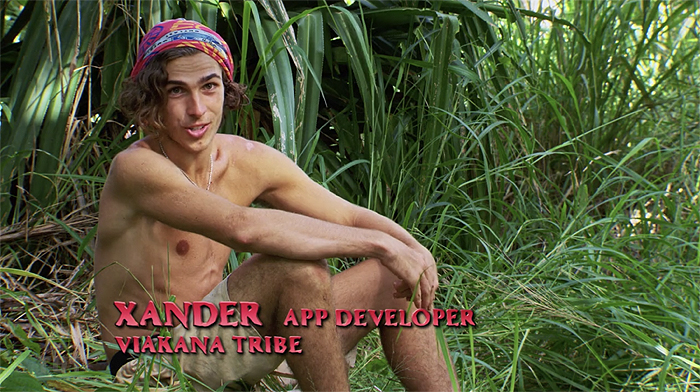
Thanks to a season-long glowing "golden boy" edit, many fans were confused and/or angry when Xander joined the ranks of the Zero-Vote Finalists Club. The edit certainly played Xander up as a traditional self-confident winner-type player, but the necessary clues were there all along that maybe, just maybe, Xander's self-assessed mastery of the game wasn't quite matching up to reality.
One main problem in his gameplay was highlighted in the finale, and had been seen since the merge. He kept offering to play his idol for people, only to never actually do so. When the Yases duped Liana, Evvie was the secondary target, and came within a vote of being voted out. After Xander had promised all day he was playing his idol for Evvie, he reneged on that promise — even as Evvie asked him to play it anyway. Later, Tiffany needed it, but nope, no idol (although here he didn't even offer it to her). Then in the finale, Xander floated the idea with Ricard that he could play his idol to save him. Not only did he end up playing the idol (pointlessly) for himself, he voted Ricard out.
Given the ordeal Xander went through to activate his idol, it's understandable he was reluctant to just give it away, willy-nilly. Still, Xander seemed to cross the line between keeping people comfortable so they don't play their Shot in the Dark and building up the false hope that he would personally save them. Not only does that hurt the person joining the jury, not following through on a promise — unlike joining a majority that votes someone out after assuring them otherwise — puts all the blowback squarely on Xander, obviously. Actively shooting yourself in the foot multiple times is not optimal gameplay. The one time he followed through on an offer was the time he shouldn't have: Taking Erika to the Final Three, rather than forcing her to make fire.
Xander also had horrific reads of the state of the game throughout the season. Pronouncing himself the top player and giving himself credit for the Shan boot (which wasn't his idea) was one thing when he did it in the privacy of a confessional. Telling the jurors he thought they all "applauded" Deshawn criticizing Erika's game during his "truth bomb" Tribal, or that they all considered Heather a "goat" and that *they* "don't respect how she's played" was quite something else. It's always a bad look to publicly criticize someone — indirectly in this case — when you have power (the immunity necklace) and they don't. But doing it in this way, by attributing the bad behavior to the jurors themselves, is the worst possible approach. Even if the jurors were thinking "Eh, I'm probably not voting for Heather" initially, as soon as he said that, they collectively bristled, frowned, and seemed to think, "What? That was rude, Xander! I would NEVER." If he'd said, "I think I can beat Heather," it's probably a non-issue. But when it's "You people over there think Heather is useless!" ... that's a problem. (Especially when Heather had spent the day telling him — accurately!— that Erika would beat him if he took her to final three.)
The "Aftershow" ... adequate, but nah:
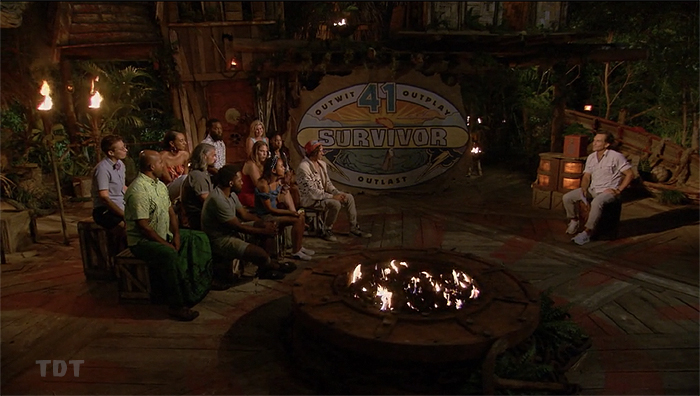
At the opening of the finale, Probst pretended a COVID-necessitated filming change (reading the votes on location) was some big "twist." Similarly, as the vote reveal transitioned to the "Aftershow," Probst slathered the hype on as thickly as possible, claiming this was something he had wanted to do for 40 seasons (and not, again, a failsafe in case COVID made a live reunion impossible, as it had with Winners at War ). Maybe Probst lying to the contestants and audience is the real "monster."
As a "show" though, it was fine, it wasn't great. They did the best they could with the situation they had. The main problem was: Nobody had seen the finished product, the TV version of what happened, but the home audience had. When you're interviewing contestants an hour after the game ended, how do you ask them about events that might end up being edited out, that the audience will never see? Still, Probst achieved his lifelong dream of not even having the pre-jurors present for the reunion show. That's not what fans want, but bully for him.
That's about where the positives end, though. As advertised, the product was indeed more raw and immediate, but that's not necessarily a good thing. It was rough watching Deshawn silently process his loss as people around him answered questions. (Xander seemed less visibly broken up about it, but maybe he's just better at faking being happy.)
Maybe Probst should worry less about people being "too polite" when he talks to them 6-12 months later at the reunion (after they've seen what happened, on their own TVs), and be more concerned about further traumatizing two starving, sleep-deprived people who just took hours of tough questions from the jury, then had immediate confirmation that they lost a million-dollar game. Even Ricard was struggling with this, and he'd had 48 hours to decompress.
Probst even touted this as "We do this anyway, just without cameras!" Okay, cool! Keep doing that! Turn off the cameras. Let these poor people eat pizza and drink champagne at their own pace. Let them answer questions or not as they see fit. Let them recover just a tad before grilling them for a national audience. Just please don't repeat this when it's no longer necessary. Doing so for any reason other than a global health crisis is just cruel.
Our unbridled excitement at seeing the same twists again in Survivor 42
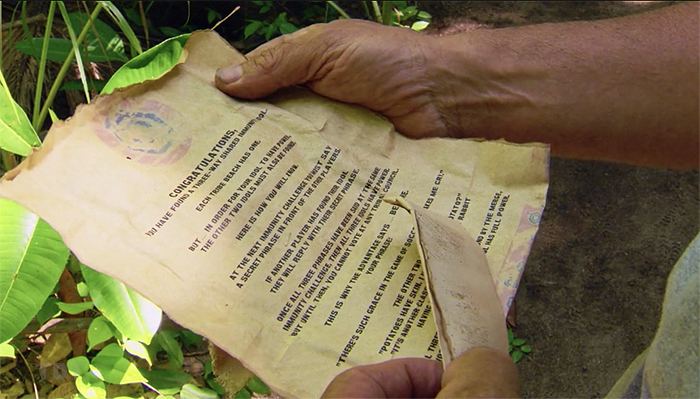
As a season, Survivor 41 was adequate. The 26-day thing ended up not really being noticeable. It felt like a regular 39-day season. The main problem was too many twists, too many of which stifled the gameplay. When the cast was unshackled and allowed to just play the game, they were fantastic (a massive blindside at Final 8, for example). But too often, there was pointless, irritating, anti-strategic stunts like "Do or Die" or forced boat rides/hill hikes getting in the way.
One of the excuses Jeff Probst always trots out to justify this heavy-handed monkeying with the show's format is that production needs to "keep things fresh" and make sure the contestants are sufficiently off-balance, so that they have to think on their feet, adjust to changing game conditions on the fly, not march through the game on autopilot.
That's a fair point. But Probst's version of "keeping things fresh" is rebranding Redemption Island as "Edge of Extinction" and bringing it back three times, after the first attempt was heavily criticized. So perhaps we shouldn't be surprised that next season we're getting ... all the same twists as this season, with the excuse that the 42 cast hasn't seen these twists play out yet. But the audience has! And a lot of them (hourglass, taking people's votes away almost weekly, Do or Die) were actively bad!
Probst promised that he'd take (some of) the 41 cast's objections into consideration, before 42 filming started (roughly one week after the 41 vote reveal). As proof of "big changes": Look, the secret catchphrases are different for the Beware Idols! Soccer, potatoes, rabbits!
Of the many, many twists this season, here are the few we would keep:
- Having both losing tribes in the 3-tribe stage attend Tribal Council: This was done just once, in the premiere. Maybe mix it up a bit and don't always have it on Day 3, because an early boot on a small tribe is always pretty random, and unlikely to be well thought-out. The plus of this twist is that it raises the stakes of the immunity challenge, and it efficiently solves the problem of needing to boot two people in a single round.
- Having half the merge tribe be immune at the merge vote: With so many people coming in armed with idols and advantages, having half of them also immune increased the likelihood of those items being played (or it would have, in a normal season where the bearers hadn't had to twist in uncertainty before activating them). It turned a wide-open pool of targets into a focused one, and helped guide the strategy. Just don't overdo it; once a season is enough.
And that's it for the keepers. The dilemmas were interesting at first, but the only cross-tribal bond that paid off was Shan and Liana, and that probably would have happened with a swap/merge anyway. It's not worth wasting a third of an episode on it for four weeks. Shot in the Dark was fine, but barely used. Both are pretty meh, on balance.
Here's what the show should immediately torpedo:
- Beware idols: The phrases were cute, but we don't need this again. It won't work in Survivor 43 or beyond anyway, so get it out of your system now, I guess. The worst parts, of course, are (1) taking away the finder's vote until the idol is activated, and (2) forcing the bearer to publicly activate the idol (or never vote). Part 1 was problematic, because as Naseer said (and he was only voteless for 24 hours), the sunk cost of having lost his vote to activate it made him less likely to play it for someone else. This was almost certainly part of Xander's tight-fistedness as well. As for part 2, they were originally called "hidden immunity idols," and they work best when they're secret. That's the drama, it's built-in. Why take that away? If you must have a public one, SurvivorAU had a much better mechanism in Brains v Brawn: as an immunity challenge was about to start, the host announced an idol was hidden at a specific spot in the challenge, and everyone was free to go dig it up whenever they felt like doing so. It was just one idol, in a barrage of normal ones. But it was far more interesting than this American torture-porn version (and because a smart player grabbed it, it paid off beautifully afterwards, too, unlike these).
- The hourglass twist: Of this season's twists, this is the one most likely to be tweaked, if not removed entirely. It's still unclear what the intended purpose was, except making the contestants mad. And clearly, Danny was irate about it. That's why there's hope: If there's one type of contestant Probst looks up to, it's retired athletes, and Danny's discontent was rooted in having been encouraged (by Probst) to compete in a grueling challenge in exchange for a specific payoff, only to have part of that prize arbitrarily taken away. He has a great point. Let's see if Probst listened.
- Do or Die: If Probst had explained what the odds of success were before people chose to compete or not, maybe it's slightly better. But his reasoning was flawed: Probst claimed people would sit out if they felt they were safe in the game — Liana clearly wasn't, and instead rightly didn't want to leave the game because she was first out of a challenge. If you just want to expose people who feel safe, you already had a mechanism that's worked time and time again: sitting out for food. Don't try to fix what's not broken!
Ugh. Let's hope we all forget the bad stuff over the next three months.
Shorter takes
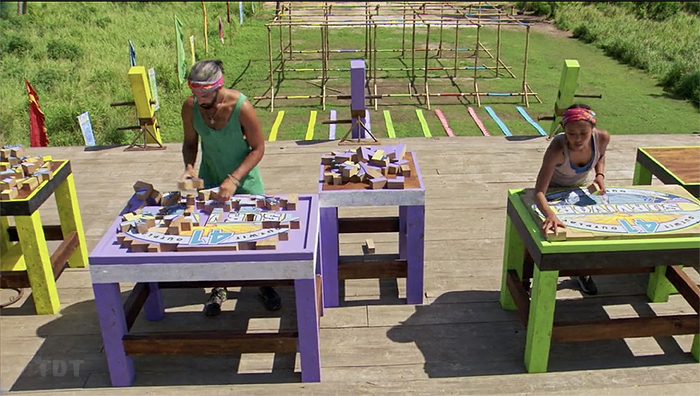
- Did the F5 challenge advantage really matter? Ricard made clear in his exit interviews that he thinks he would have won the Final 5 immunity challenge had Erika not had her 4-rung headstart. Maybe? But looking at Erika putting in the final pieces (above), that doesn't really seem like it's supported by the evidence. Erika had a pretty significant lead, and had been good at puzzles all season. Also, despite Ricard's claims to the contrary in exit interviews, he still had a stray puzzle piece underneath his table. The challenge advantage was not a great idea at this point in the game, but were it not there, this challenge would at least have been close(r than the show made this version appear).
- Performing exactly as expected: The Final 4 immunity challenge also has some problems that are only now becoming apparent. It's been used three times (counting Survivor AU), and each time the winner has been a tall, extremely fit young man: Chris Underwood, Emmett Pugh, and now Xander Hastings. Looking at this edition, while you wouldn't expect it in theory, a short person like Erika was at a significant disadvantage, because she had to move farther back to pick up a block each time, and she didn't have the reach of a Xander. No doubt Survivor sees this as a feature, not a bug. But just saying: It doesn't seem like a particularly fair challenge, and the results back that up.
 Jeff
Pitman is the founder of the True Dork Times,
and probably should find better things to write about than
Survivor. So far he hasn't, though. He's also responsible
for the Survivometer, calendar, boxscores, and contestant
pages, so if you want to complain about those, do so in
the comments, or on twitter: @truedorktimes
Jeff
Pitman is the founder of the True Dork Times,
and probably should find better things to write about than
Survivor. So far he hasn't, though. He's also responsible
for the Survivometer, calendar, boxscores, and contestant
pages, so if you want to complain about those, do so in
the comments, or on twitter: @truedorktimes
ADVERTISEMENT
y